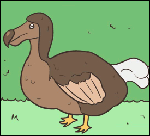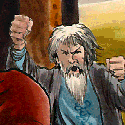|
Hello Mesolithic. Let's put this journey a little into perspective. The paleolithic is older than humans. It's older than Homo. It started about 3.3 million years ago. That's when hominins first started using stone tools. Anatomically modern humans are about 200,000 years old, and behaviorally modern humans about 50,000 years old.The mesolithic started as early as 20,000 years ago in the Near East and 14,000 years ago in SE Europe. In Western and Central Europe, it lines up with the start of the Holocene, 11,500 years ago, but more on that later. 3.3 million years is obviously a long time, so the paleolithic is itself divided into three subdivisions, lower, middle, and upper paleolitic. The lower paleolithic starts 3 million years ago. I'm not sure if that's rounding issues from two different sources, or that's how long it took from the discovery of stone tools until the wide adoption of them and that's when the lower paleolithic starts. It continues until about 300,000 years ago. During this period, you have the emergence of the Homo genus, and most of the species in that genus. Worthy of note are Homo Habilis (named as such because it was believed to be the first user of tools, but that's not the case), and Homo Erectus (upright or standing man). There are arguments based off of skull shape that Homo Habilis should be reclassified as Australopithecus Habilis. This period was marked obviously by the invention of stone tools. Aside from that, prominent advances included language, as well as the transition from scavengers that supplanted their diet with fruit to hunters. This probably happened at the start of the Pleistocene (aka. the last ice age), 2.5 million years ago, when reduced evaporation, and therefore reduce rainfall, caused savannas to expand into what had once been forests, disturbing the food supply and habitat of prehistoric man. There were also several migrations out of Africa, but not the the main migration out of Africa of modern humans. The last common ancestor of Humans, Neanderthals, and Denisovans lived about 800,000 years ago. About 300,000 years ago, the middle paleolithic or middle stone age starts. It's confusing that middle stone age refers to the middle paleolithic and not the mesolithic, even though mesolithic literally means middle stone age, but I digress. The middle paleolithic lasted until 50,000 years ago. During this time period, you saw the rise of art, including beads, drawings, and the use of ochre. Fishing and the hunting in groups for large game also arose in this period. The oldest ceremonial burials date back to this time period, although there's some evidence that burial could be even older than that. Fire is another point of uncertainty. There's evidence that fire was first used in the lower paleolithic, and even cooking is as old as 1.9 million years, but it didn't get widespread use until the end of the lower paleolithic, or the start of the middle paleolithic. 200,000 years ago, saw the emergence of anatomically modern humans, but some sources point to as early as 300,000 years ago. Neanderthals arose about 250,000 years ago (although as mentioned previously, they already diverged 800,000 years ago). The middle paleolithic saw much more complex tools, composite tools (attaching a bone or flint spearhead to a wooden shaft). You also get clothing invented during this time. The upper paleolithic is where things start picking up and get interesting. Starting at 50,000 years ago, this coincides with the rise of behaviorally modern humans, although that's a controversial claim. During this time period, you have the explosion of H. sapiens migration across Europe and Asia, as well as the extinction of Neanderthals and Denisovans. There's controversy on whether this was an active extermination/genocide, outcompetition, or crossbreeding, but with one side having a larger population and dominating the genetic aftermath. Whatever it was, all humans, aside from sub-Saharan Africans, have 1-4% of their DNA coming from Neanderthals. Neanderthals in my DNA? It's more likely than you think. posted:These are some anatomical features that you can credit your neanderthal ancestors: With all other human species extinct, Homo sapiens had free reign in the world. There are flutes, and signs of oceangoing and deep sea fishing. You get figurines of animals, and then later of humans. 33,000 years ago, we find domesticated dogs. 29,000 years ago, ovens. 28,000 years ago is the oldest twisted rope we've found, but that is an easily perishable item that could have existed long before the oldest preserved evidence of it. 25,000 years ago gives us both clay figurines (but not yet vessels), and the first permanent human settlement. 22,000 years ago marks the Last Glacial Maximum (LGM), the furthest extent glaciers made towards the equator. 20,000 years ago, you have the first pottery vessel (in china), and the start of the epipaleolithic or mesolithic in the Levant. This is where inception now stands. If I haven't bored you with the wall of text yet, here's a quick summary of the techs so far: Paleolithic: Bone tools: 1.5 million years ago. Composite tools/flint working: No idea Leather: No idea Slings: Some point in the upper paleolithic, but they degrade and haven't been preserved, so we don't know when they emerged. Spirituality: 130,000 years ago. No idea when totems were first made though. Dog Domestication/training: 33,000 years ago (but the oldest uncontroverted remains are only 14,200 years old). Mesolithic: Ceramic pottery: 20,000 years ago
|
|
|
|

|
| # ? May 3, 2024 03:39 |
|
Hell yes, I love this kind of poo poo, its part of why I like Dawn of Man so much in the first place. Are there any books that examine this period, going over what life might have been like for the super early settlements, and their challenges and discoveries?
|
|
|
|
Interesting overview General Revil. I found dates vary widely for most things depending on who you ask, which is one of many reasons why I'm cautious and speculative about any sort of firm conclusions regarding the timing of these things when it predates anything vaguely resembling scientific observation by so long. But, using the numbers you mention, that would mean so far we've 'covered' - in the sense of barely mentioning the most important aspects - ~3.28 million years of history in less than three hours of video length, or well over 300 years per second. Give or take, that's nearly 99% of the intended timeline. We'll be slowing down just a tad from that perspective as matters proceed. .
|
|
|
|
ShootaBoy posted:Hell yes, I love this kind of poo poo, its part of why I like Dawn of Man so much in the first place. I'm not aware of any, but that's because I've just done a cursory overview of this period. What got me interested in this is figuring out how people came up with these ideas. I was primarily interested in bronze and iron since those are huge intuitive leaps. I hope to go into more of that later once SS gets to that point in the game. Strategic Sage posted:Roughly four years of gametime. Not all that long - though longer than it would be on default settings of course. The tedium of time passing is now going to be gradually replaced by the different-flavored tedium of the hunting minigame, as the growing population requires more and more of the resources that can only be acquired from the wildlife. It doesn't help that you're playing reasonably/realistically as opposed to building, crafting, and hunting in order to get grind for knowledge as quickly as possible. While adding some realism, this does mean that knowledge is a slow commodity to accumulate. The smart way to play this game is to use all of your villager's free time to craft a stupid amount of tools and weapons and trade them to traders either for raw materials, or more techs. The high amounts raw materials harvested combined with the high production of finished goods causes you to gain knowledge quickly, plus you pick up techs from traders. However, this highly inaccurate. What we can tell from modern hunter gatherer societies is that they have way more free time than we do. They hunt and gather mostly to a subsistence level, and then have the rest of their time devoted to other things. Invention usually isn't one of those things. Until you get into a society that values and rewards inventiveness, technological progress was either achieved through necessity or accident. Strategic Sage posted:Interesting overview General Revil. I found dates vary widely for most things depending on who you ask, which is one of many reasons why I'm cautious and speculative about any sort of firm conclusions regarding the timing of these things when it predates anything vaguely resembling scientific observation by so long. But, using the numbers you mention, that would mean so far we've 'covered' - in the sense of barely mentioning the most important aspects - ~3.28 million years of history in less than three hours of video length, or well over 300 years per second. Give or take, that's nearly 99% of the intended timeline. Oh, the dates vary like crazy. Part of it is that as new remains are discovered, we learn more that we didn't know previously. This leads us to things like Homo habilis. It literally means "Handy man" in Latin (but not "handyman"), because people thought that was the first tool using species. Turns out, tools are older than that, and were first used by Australopithecus. Another example is how hominid has changed to include all great apes as our genetic understanding has improved and species have had their taxonomy reclassified. Hominin now means all humans and extinct ancient human species, which is what Hominid used to mean. https://australianmuseum.net.au/learn/science/human-evolution/hominid-and-hominin-whats-the-difference/ However, another cause is that a lot of this is open to interpretation. We just catch tiny glimpses of the past from artifacts that we find. So much can be colored through bias, contaminated data, and random mistakes. Without getting too much into this before the iron age, there are a ton of issues with the African iron age. We know sub-saharan Africa did not have a bronze age, but it did have an iron age. Most of the data points to it being late compared to other cultures, but there's a disputed dig that puts the African iron age as starting before the bronze age elsewhere. The question is, if you disregard that data point and believe it's caused by contaminated charcoal (the charcoal is much older than the iron), are you disregarding it because of common sense and accepting the other evidence that says Africa had a late iron age, or is it coming from racial/cultural bias. However, the bias question also applies. If you accept the disputed dig site, are you following a long history of certain dig sites being able to completely overturn everything we thought we knew on a subject, or are you doing so from a racial/cultural bias in the other direction. Then on top of all of that, the further back we go, the larger our error bars are. Any dates from the lower paleolithic can be safely assumed to have error bars measured in hundreds of thousands of years. So really, we just have a bunch of smart people making their best educated guesses and hoping it more or less makes sense. As for the speed in which you've covered this, we can safely say you didn't start at the start of the paleolithic. These are clearly anatomically modern humans, so the earliest possible start could be 200,000-300,000 years ago, and needing an excuse for why they forgot how to shape bone tools. But, your backstory actually makes this a little plausible (not really, but if you squint really hard...). You mentioned in the backstory that Varenkal and the women and children fled from some disaster, with Varenkal's spear and biface, and the rags on their backs. If we ignore the bone tools for a moment, because sadly I have no explanation for the lack of them, this could have started somewhere between the start of the upper paleolithic, and the domestication of dogs, so 33-50 thousand years ago. That can reduce the time compression to something more like 30,000 years in three hours, or 27 years per second.
|
|
|
|
ShootaBoy posted:Hell yes, I love this kind of poo poo, its part of why I like Dawn of Man so much in the first place. If you want something that gives a nice overview of European prehistory (from Paleolithic till Iron age) try reading a book "Europe Before Rome: A Site-by-Site Tour of the Stone, Bronze, and Iron Ages" by Douglas T. Price. It goes over some of the most important sites, and it gives literature for those in the back, so less cumbersome read for a newbie/intermediate in the field.
|
|
|
|
Jesenjin posted:If you want something that gives a nice overview of European prehistory (from Paleolithic till Iron age) try reading a book "Europe Before Rome: A Site-by-Site Tour of the Stone, Bronze, and Iron Ages" by Douglas T. Price. Excellent! Though woof, those amazon prices, $40 used, 30 bucks even on kindle. Its definitely on my list though, even if I have to spend a while tracking it down elsewhere.
|
|
|
|
PSA: You may have noticed the schedule's gotten a bit sporadic here, and that will continue. For the past three weeks now, I've become a 'professional shopper', which I plan on continuing to do even after the pandemic abates. This hobby has become a bit of a casualty of that. Lots of adjustments are happening for me personally; physical, psychological, daily routine, and so forth. This project and the others will proceed, but at what frequency is anybody's guess. I don't have any good sense of how long it will be before a 'new normal' emerges, only that I'm not there yet. I even briefly considered doing sort of a parody of Rarity's project, which I would have entitled Commerce In The Age of Corona, but decided there wasn't enough there to really make it interesting.
|
|
|
|
Just make sure it's a legit job, not a check scam. Don't worry about us, we'll stick around, even with the slipping schedule.
|
|
|
|
It's a legit job - Shipt if anyone cares. I'm already getting paid like and everything. But thanks for looking out.
|
|
|
|
Just binged this entire LP and I must say I really enjoy your style of favoring realistic gameplay and explaining historical context over optimizing for resources and knowledge gain. That latter style kind of put me off some other LPs of this game I tried to watch. Looking forward to seeing more.
|
|
|
|
Thanks - it's always nice to have like-minded people enjoying what I'm doing. This week has been a fun mess of laziness as well as dealing with insurance and tax 'fun', but sooner or later I'll get more up - I've played through the Mesolithic, just need to get things packaged up.
|
|
|
|
 New Food Sources (20:57)  Keeping the food supply ahead of the smooth population growth curve is the first order of Mesolithic business. Along that line is the historical dive into the Mortar & Pestle, and not being culinarily inclined, I am surprised to learn that they are still regularly used even in developed societies today. A long-dormant predator threat shows itself as well, and the first stages of a medium-term expansion plan for the village of Inception are put into action. Strategic Sage fucked around with this message at 23:07 on May 22, 2020 |
|
|
|
Are both links supposed to point to the episode, or was the second one supposed to be something else? Bread! This is something that I'll go into a little more detail later, but a little info now. This is a big turning point for teeth. Grains have all the advantages SS mentioned in the video. However, they also brought about big problems for teeth. A carnivore diet is actually really healthy for your teeth. The bacteria that cause tooth decay thrive in carb-heavy mouth ecosystems. They digest leftover bits of carbs, and the acidic byproducts eat away at teeth. To make things even worse, using a mortar and pestle to grind grain into flour also grinds away some of the rock, which gets mixed with the flour and abrades teeth.
|
|
|
|
No they're not - that whole teeth thing didn't occur to me, good point. Anyway link fixed; second one now properly points to the Serious Eats mortar & pestle video.
|
|
|
|
Well, life appears to be reasonably stable in Inception, and the population is continuing to grow. The developments this time around are more adaptions to that larger population- helping make sure food sources are secure- rather than true leaps forward in quality of life. But time goes on, and as the population grows, it will eventually allow for the development of new ideas that will lead to better lives...
|
|
|
|
 Growing Challenges (23:58)  At times the population increases in Inception threaten our flow of resources, but so far I've always been able to adapt reasonably quickly. A couple more historical sidebars, including some things I learned while making this video that I thought worth sharing. We've now plowed through all of the relatively minor advances of the Mesolithic Era, and are ready to make another jump. As I mention at the end of this, that means the next episode won't have Dawn of Man in it at all. It's time for lots of
|
|
|
|
Just before we're clicking on the history changing option, I think a few of those pics you used were a bit too zoomed in, the totem one, in particular. And there's gonna be a lot of talk about agriculture, a lot. SIGSEGV fucked around with this message at 21:04 on Jun 2, 2020 |
|
|
|
SIGSEGV posted:Just before we're clicking on the history changing option, I think a few of those pics you used were a bit too zoomed in. Seconded.
|
|
|
|
Which totem one (there were two of them). Reason I ask is that on one of them, I purposely zoomed it in more than usual to see more of the detail because I thought it was too hard to see from a distance.
|
|
|
|
Not the totems, those were fine (for me). I was thinking about the sickle images. The bone one, I couldn't tell what the heck was going on, and the copper/bronze one was just a green stick as far as I could tell. It wasn't even visibly curved due to how far zoomed in it was.
|
|
|
|
The zoomed in totem one was a bit confusing because you were talking about the meaning of the stacking at the moment it came up. I completely got the serrated aspect off the zoomed in bone sickle but the curvature of the kopesh was completely invisible.
|
|
|
|
Thanks a lot guys! I went back and looked and most of them definitely weren't supposed to be zoomed in as far as they are. There's definitely something going on there that I'm not intending. I'm going to need to do quite a bit of experimenting with that I think - good timing for the suggestions as well. I can see for sure how that would be super-annoying, esp. on a longer exposition like the next episode will be (haven't started it yet so there's plenty of leeway still).
|
|
|
|
Sounds like the next part is going to be the perfect time for me do my next background post. The Neolithic is really interesting.
|
|
|
|
 The First Wave (26:47)  Finally got this done. My take on the Neolithic Revolution, questions surrounding why it happened and why it matters, implications for human society and life, the somewhat non-traditional framework I favor for understanding history, ethical questions posed by the issues that come out of the development of agriculture, etc. Up Next Taking a break for the CW4 demo, then we'll be back to taking the growing village of Inception into the Neolithic era. I am very much interested in feedback on how the series is going at this point. Particularly things like whether I should alter the gameplay/history balance in either direction, concepts that I've spent too much time on or glossed over, etc. We're probably approaching the midpoint of Dawn of Man now, and I've gotten my feet wet in the HP concept so it seems to me a good point to reassess a bit as we move towards the conclusion here and eventually the next chapter/game beyond this one.
|
|
|
|
That's a bunch of info. I'll do a little summary of the mesolithic in a post soon. One thing I wanted to mention that you touched on in the video. Agriculture is a lot more work intensive than hunting and gathering. It was far more work, led to a poorer, less diverse diet, destroyed teeth (again, more carbs, and abrasive rock dust in the flour), and probably shortened lifespans. The advantages though were that it increased the carrying capacity of the land, and could be stored for hard times in the future. You can easily find this "more work" aspect in nature. Herbivores spend most of their time eating because the food they eat is calorie poor. Carnivores spend very little time eating, even if you include time spent hunting under the "eating" category. Like SS pointed out this stable and secure food source allowed the population to grow. Once it did, there was no going back to hunting and gathering. The population outgrew the carrying capacity of the land, and trying to go back to hunting and gathering would simply depopulate the land of game, and leave the humans to starve if they didn't stick to agriculture. I also subscribe to the wave theory. The agricultural, industrial, and information revolutions are the three biggest changes in the way humans live. From a very high level view, you can even argue that these are the only three innovations that actually matter. Each of them fundamentally changed the way people live, and that was associated with a lot of pain associated with the change. It's rather timely with the protests and riots that are going on around the US and even internationally. There are a lot of causes, from the immediate (the killing of George Floyd), to the surface level circumstances that allowed it to explode the way it has (lots of people with cabin fever from the Covid quarantine, and being laid off from jobs giving them time to protest), to the deeper concerns that have been building up over years and decades (policing and racism), to what I believe is the deep underlying cause. Agriculture allowed for cities to grow. Industrialization demanded it. The information age is rendering cities obsolete. This is leading to the very slow collapse of cities as some industries move, and others move away. Prosperity allows for underlying divisions to heal, and the lack of it allows for divisions and hatreds to fester. Until we reach the new steady state of a fourth wave society, we will have these growing pains.
|
|
|
|
I was planning to read up on the agricultural transition before watching this, but I had other things to do, so I'm going in without having done much homework. First I'll bring up something I can't find because of search result poisoning and, well, lack of effort: Still existing hunter-gatherers take care, in a basic way, of trees and other plants that they find useful, even as they are moving across entire regions, as they will come back in the area and benefit from that care. And I believe this makes another element contributing to the establishment of agriculture as a way of living. Humans were already doing proto-agriculture for a while. Here's a somewhat related article regarding war and agriculture, somewhat, that some will find interesting, considering our subject. I'm not too big on the wave theory of history, I have things against it that I can't quite place, and if I could, I'd be too stupid to word them properly. I'd say our ideal relationship with nature is one where we accept that it is our life support system and that we badly need it to perform well, and that we should take measures to ensure that.
|
|
|
|
General Revil posted:There are a lot of causes, from the immediate (the killing of George Floyd), to the surface level circumstances that allowed it to explode the way it has (lots of people with cabin fever from the Covid quarantine, and being laid off from jobs giving them time to protest), to the deeper concerns that have been building up over years and decades (policing and racism), to what I believe is the deep underlying cause. Definitely agree with the growing pains part, although I tend to associate it more with automation, the global economy in general, energy costs, the various good and bad possibilities of AI, decline of manufacturing, etc. We don't know what to do with our current reality yet and probably won't for quite a while. Of course, that whole picture will look quite a bit different even than it does now by the time I get to the modern age. SIGSEGV posted:Still existing hunter-gatherers take care, in a basic way, of trees and other plants that they find useful, even as they are moving across entire regions, as they will come back in the area and benefit from that care. And I believe this makes another element contributing to the establishment of agriculture as a way of living. Humans were already doing proto-agriculture for a while. Definitely true - I was just more concerning myself with making the leap from that to large-scale planting and building settlements rather than nomadic migration patterns. I thought that was quite an interesting article, thanks for sharing it. The whole formation of the first large-scale 'governments' and so on is something that I'm staying mostly away from until the next game since Dawn of Man is more focused on the smaller scale and doesn't really deal that level of societies emerging. It is definitely an interesting period to consider. Strategic Sage fucked around with this message at 12:06 on Jun 23, 2020 |
|
|
|
Strategic Sage posted:Definitely agree with the growing pains part, although I tend to associate it more with automation, the global economy in general, energy costs, the various good and bad possibilities of AI, decline of manufacturing, etc. We don't know what to do with our current reality yet and probably won't for quite a while. Of course, that whole picture will look quite a bit different even than it does now by the time I get to the modern age. I think we're agreeing, just looking at it from points of view. I'm focusing on the rise of the third wave economy, and the disruptions that causes, and you're focusing on the end of the second wave economy and the disruptions that causes.
|
|
|
|
Why I'm Not Jumping Ship I don't know if posting this in my threads is the right thing to do. I would prefer just to keep them focused on the LPs themselves - that is after all what I do here - but with some of the rhetoric being tosed around I don't want people to get the wrong impression of my perspective here. Everyone should do what they believe is best - if that means you don't want to participate with anyone still hanging around SA, do that and I wish you a great life. But I will decidedly not be part of the bash-Lowtax bandwagon. Here's why: ** This should go without saying, but the behavior that's been alleged is inexcusable and wrong. ** It's not my place to judge Lowtax. That's for others to do. If guilty, I hope he gets punished for it. ** Me leaving SA would not punish Lowtax. I've never contributed to his Patreon or directly interacted with him in any way. ** For me to leave because I didn't want to be associated with the website due to these allegations would be grossly hypocritical for two reasons. One, I know for a fact I consume products every day from companies who do far worse. I put gas in my car. I buy clothes and food. I support reform in how many industries are permitted to do business, but the point is stack up the evils perpetrated by those organizations to what we're talking about here and it's not close. And I'm not even buying anything I haven't already bought from Lowtax. It's not at all clear to me, contrary to rhetoric from a lot of corners right now, that there even is a moral component to doing business with those who do things we don't like. If that's the case, might as well outlaw all commerce right now. ** The second reason is I'm not any better than Lowtax. I've never committed those kinds of violent acts he's accused of, but part of that is probably me being a rank coward and possessing rampaging social anxiety. I certainly know I have done a great many things in my life I'm not proud of. For me to self-righteously point fingers while knowing the people I've hurt through my own selfish stupidity that I would erase in a hearbeat if I had the chance - I don't, all I can do is try to be a more noble person with the rest of my life - would be absurd and dishonest. So here I am, continuing on. Not in support of Lowtax, but in support of the community here that has given me far more than I could ever return to it no matter what I choose to do, and because it has value for me. I also believe that forgiveness and grace are among the greatest values, and I extend those to others just as I would hope they would extend them to me when I am an unmitigated asshat. Feel free to make whatever judgements you wish, but I'm not going to turn my LP threads into a debate.
|
|
|
|
 Neolithic Transition (30:38)  First steps into farming, and I slow down some to give a sense of what the rhythm of the town (?) of Inception is like at this stage. That basically boils down to lots and lots of hunting whenever we can cram it in. The starting three grain crops are discussed and we plant the first two of them. We'll start getting into what other kewl developments we are going to invest in next time; there's a lot to choose from.
|
|
|
|
Strategic Sage posted:Why I'm Not Jumping Ship I just want to give you a little encouragement in that I'm definitely going to continue following this regardless of the current drama, even though I've always been more of a lurker ever since I joined. I didn't even know who Lowtax was or notice that the site was slowing down until you mentioned it and looked it up myself.
|
|
|
|
Thanks - kind of you to say so. And new episode goes up tomorrow so there'll be something else on topic to consider.
|
|
|
|
 Raiders & Reconstruction (21:37)  Our first batch of raiders attacks, and another advance puts us in the situation of basically needing to rebuild almost the entire town. We have work to do. A lot of it. For probably the first time, it would actually be really nice to just have the pace of advancement slow down.
|
|
|
|
You convinced me to pick the game back up. I'm now at the beginning of the copper age and hoping the fact I haven't fully completed a palisade doesn't bite me.
|
|
|
|
It shouldn't unless you are doing something extreme. I've actually never bothered even making a serious effort at it prior to this run. On default settings it's more of an aesthetic/nice-to-have aspect that is just cool to have a wall around your settlement than anything you actually need. Enjoy the metal toys!
|
|
|
|
 Livestock, Megaliths & More (23:11)  Introducing more domesticated animals, really big rocks, and some ponderings about the questions raised by ancient human megaprojects. Inception is overloaded with work like never before, and managing that workload between the various outsized undertakings we're involved in is job one for me at the moment. The pace of advancement is starting to slow down some, but every new unlock has a lot of work and change attached to it. Turns out you can't just snap your fingers and undertake a transformation in a settlement's way of life.
|
|
|
|
 Weaving (23:29)  Some projects get finished, and some new ones begin. A food crisis is averted, and we have new infrastructure and tasks to perform, having now learned to domesticate sheep and use their wool to provide ourselves with improved clothing. Overall it's a busy few years for Inception, but we are now looking like a full-fledged agricultural town and appear poised for another period of growth.
|
|
|
|
drat this game looks like my jam!
|
|
|
|
The last couple episodes have big: ... energy
|
|
|
|

|
| # ? May 3, 2024 03:39 |
|
I know it's been a while here - I'm starting to resurface from a deep dive into what I think is going to be my next retro project along with recovering from a severe poison ivy or similar reaction. Note; I do not advise said reaction. It's on my list of things to not do again, ever. New episode should be up later today. Deadmeat5150 posted:drat this game looks like my jam! It's a good one in a niche that could use more games IMO. You might be interested to know that the 1.6 patch recently came out, which adds armor. OddObserver posted:... energy That's one way of putting it.
|
|
|















